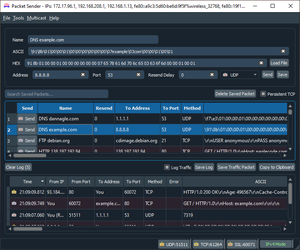Packet Sender
Packet Sender is an open source utility to allow sending and receiving TCP and UDP packets. It also supports TCP connections using SSL. It is available for Windows, Mac, and Linux. It is licensed GNU General Public License v2 and is free software.[1] Packet Sender's web site says "It's designed to be very easy to use while still providing enough features for power users to do what they need.".[2]
 | |
 Packet Sender GUI | |
| Original author(s) | Dan Nagle |
|---|---|
| Stable release | v7.05
/ July 26, 2020 |
| Written in | C++ |
| Operating system | Cross-platform |
| Type | Packet generator |
| License | GPL v2 |
| Website | packetsender |
Uses
Typical applications of Packet Sender include:
- Troubleshooting network devices that use network servers (send a packet and then analyze the response)
- Troubleshooting network devices that use network clients (devices that "phone home" via UDP, TCP, or SSL—Packet Sender can capture these requests)
- Testing and development of new network protocols (send a packet, see if device behaves appropriately)
- Reverse-engineering network protocols for security analysis (such as malware)
- Troubleshooting secure connections (using the SSL server and client).
- Automation (via Packet Sender's command line interface or resend feature)
- Stress-testing a device (using intense network generator tool)
- Sharing/Saving/Collaboration using the Packet Sender Cloud service
Packet Sender comes with a built-in TCP, UDP, and SSL server on multiple ports a user specifies. This remains running listening for packets while sending other packets.
Features
As of version v6.2.3 Packet Sender supports the following features:[3]
- Live traffic log (Time / From IP / From Port / To IP / Method / Error / ASCII / HEX)
- Persistent TCP and SSL Connections
- Portable Mode
- IPv6 Client / Server
- IPv4 Subnet Calculator
- EBCDIC translation
- Saved packets (with sending directly from saved list)
- Mixed ASCII packet notation (ASCII with embedded syntax to allow hex)
- Multiple TCP servers
- Multiple UDP servers
- Multiple SSL servers
- Multicast send and receive
- Packet resending at n intervals (where n is seconds)
- Multi-threaded TCP/SSL connections
- Command-line interface
- Packet responses
- Smart Packet responses
- Macros inside packet responses for TIME, DATE, UNIXTIME, RANDOM, UNIQUE
- Packet search (for saved packets)
- Packet export/import
- Intense Traffic Generator (UDP Flooding)
- Quick-send from traffic log
- Save traffic log
- Packet Sender Cloud
Platforms
- Windows (64-bit)
- OS X (Intel-based x86-64)
- Linux (Source Distribution with Qt or x86-64 AppImage or Snap)
Packet Sender Mobile is also open source [4]. It is available on iOS and Android and is MIT License and written in Xamarin. It only has the core features of desktop Packet Sender (send, receive, TCP, UDP, and Cloud).
References
- "Packet Sender License". Retrieved 15 February 2015.
- "Packet Sender Main Site". Retrieved 22 February 2014.
- "Packet Sender Documentation". Retrieved 27 June 2018.
- "Packet_Sender_Mobile GitHub". Retrieved 27 June 2018.